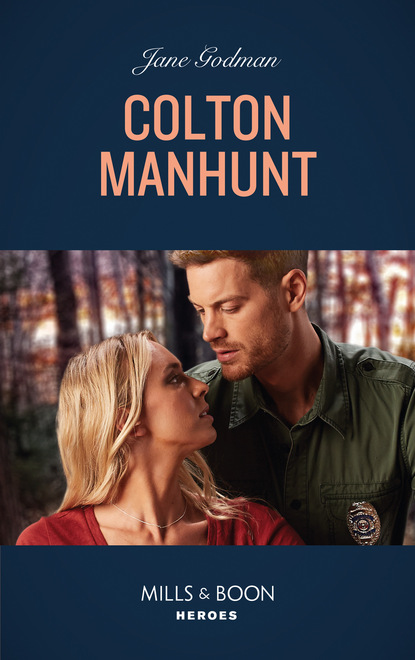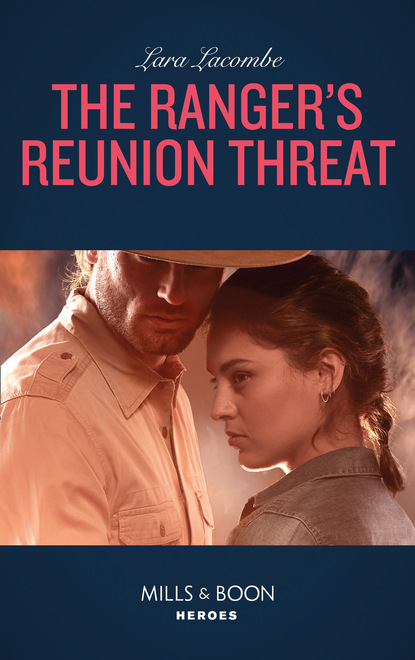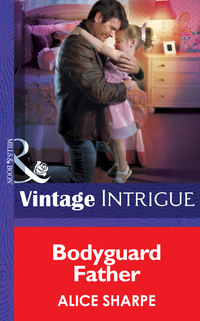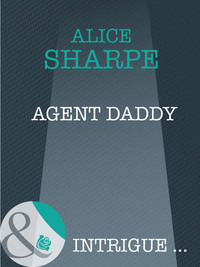
Полная версия
Hidden Identity
Except for a brief moment when everything had changed.
But like most miracles, his had come and gone like the sweep of a clock’s hands and he was back to square one.
He applied a clean bandage to his shoulder and taped the gash over his eye. His short beard softened his jawline while the spikey blond hair on his head always struck him as comical. He had one week to go before he cleared out of here and then he’d—
A thumping noise outside lifted every hair on his arms. Even before he separated the blinds above the bathroom sink and angled his head to peer outside he knew what he would see. A low-flying helicopter approached the cabin from over the meadow.
Oh, no...
Within seconds, he grabbed the glasses, shrugged on his shirt, rescued his gun from the top of the toilet tank and stuffed it into his waistband. He ran to the back door and snatched the loaded rifle he kept there, then let himself out and moved to the northeast corner of the deck, where he could track the helicopter.
One thought drummed in his head: they found me.
He expected the aircraft to land in the meadow, close to the house. He expected an army of men to disembark, guns blazing, Holton’s revenge swift and lethal.
He didn’t expect the helicopter to look so ancient. It wasn’t his adversary’s style. Was this flyby simply a matter of a stranger’s harmless curiosity about the old house or was it more than that? Had Holton employed mercenaries?
The helicopter didn’t land and that left Adam relieved and yet confused. It flew toward the river, gently descending above the water, where it remained for a minute or two. Then the aircraft tilted suddenly—that had to throw the passengers around a little. He stepped around the corner of the house to see better. The chopper moved away from the river, briefly hanging over the meadow, then it climbed eastward toward the forest, its movements jerky and unpredictable.
Engine trouble? Trouble of some sort, that was for sure, including trouble for him. Even if it disappeared over the far mountains, the fact that it had circled the house meant that it was time for him to clear out. It might have been reconnaissance for a ground-based unit who even now could be advancing via the only road connecting this cabin and the nearest town. He’d rigged a sensor down at the beginning of his twisting lane. Once activated, it would beep the monitor in his pocket and he would know he had about ten minutes to disappear.
A sudden noise caught his attention and he turned to see the helicopter’s aft rotor tangle with the top of the tallest tree. Parts went flying. The aircraft seemed to stall. Nose down, it disappeared into the forest. He jumped off the porch, the rifle still clutched in his hand. While his brain told him to get the hell out of there while he could, his heart said he had to see this through.
Crashes and thuds echoed from the forest. A fiery explosion seemed inevitable, but none came, just the continuing cacophony of breaking trees and mangled metal. He vaulted the rock wall and sprinted across the meadow, ever wary of a sniper but growing more convinced by the moment that what had happened was an accident and that lives were in danger.
And this meant other people would be coming, as well. Friend or foe, this crash would be investigated and that would bring killers and cops right to his doorstep. Turn around and go back—get out of here now. He ignored his own warning.
After the full light of the meadow, the forest seemed dank, dark, secretive. He’d been away from Arizona, his home state, for more than a year now, and never more than at this moment did he miss the open desert terrain and the warm, dry air. The underbrush was difficult to traverse. His own crashing noises echoed in the dense closeness as he headed in the direction he figured the chopper had gone down. There were few other sounds.
He finally emerged into a clearing of sorts, but that quickly erupted into a battered, mowed-down trail of broken branches and flattened saplings. It had to be at least thirty feet across, lined with scarred trees and pieces of metal strewn about. The faint smell of fuel urged him forward. And sitting at the end of the trail was the downed chopper, bladeless now, the rear end still mostly intact, no signs of fire or of life.
He made his way down the newly created and narrowing path to the tail of the helicopter. As he moved forward, he saw the crumpled metal of the front of the chopper. It was about half as big as it should have been, thanks to an old growth stump that had put an end to its forward momentum.
The cargo door was the only possible way to get inside. It had jammed, though. He searched for something to use as a makeshift crowbar.
“Anyone in there?” he yelled as he picked up a branch and discarded it. Too flimsy. He continued the search. “Hello, can anyone hear me? Can you open the cargo door?”
He finally found a long piece of metal, probably a portion of one of the blades, maybe a piece of a skid. Using that, he leveraged it into the door crack and shoved. Eventually, the metal moved and he was able to slide the door half-open.
Boxes and crates filled the rear of the aircraft. The passenger and pilot seats had been pushed back. There was just room for him to step inside and almost stand. He shifted debris to clear his way to the pilot, where he paused a second before putting his fingers against the pilot’s throat, but it was for confirmation only. The poor guy sat half-crushed behind the controls; broken glass had slashed his face and hands. His right shoulder sported an ugly wound that looked like a gunshot. That, however, didn’t make sense.
Turning his attention to the passenger, Adam moved aside leafy branches and glass until he could check for a pulse. He detected a faint heartbeat and immediately began clearing debris, careful when he came across a two-inch pine spur lodged in the base of the man’s throat. That’s when he also noticed the guy had one limp hand threaded around the grip of a revolver. The safety was off. Adam gingerly reached for the weapon but as he did so, the guy’s eyes opened and his grip tightened.
“Take it easy,” Adam said.
The man struggled to focus as blood ran down his forehead and cheeks. He finally croaked out a single word. “You...”
“I’ll get you out of here,” Adam said, though he knew that was probably impossible. “Stay still.”
“You’re...a—a dead man,” the injured man mumbled. As he spoke, he managed to raise his arm until it bumped against the spur lodged in his throat. The branch ripped free, leaving a hole big enough around to stick a thumb through. The guy’s hand immediately fell back to his lap as blood spurted from his carotid artery. Adam tore off his own shirt to hold against the gushing wound but it was too late. He’d bled to death in those few short seconds. Adam shrugged his shirt back on as he studied the lifeless and unfamiliar face.
There wasn’t a doubt in Adam’s mind that this guy had been sent by Holton. He dug out the man’s smartphone from his jacket pocket. As it required a code, he wiped the blood off the dead man’s right pointer finger and held it against the fingerprint reader to get around the code, his heart sinking when he saw a call had been made to Arizona within the last thirty minutes. “Leave a number” was the only response when he hit Call. He turned it off, wiped off his own fingerprints and put the phone back where he found it. There was no reason to try to disarm the GPS system, not when the gadget was sitting in a downed aircraft with an emergency locator of its own. He scanned the guy’s wallet. It held what was probably a fake ID and a little cash. He replaced it. Straightening up, Adam glanced at the pilot, but there was no way to access the poor man’s pockets. The gunshot wound in the man’s arm kind of cinched his position as a hapless victim in this scenario anyway.
This had to be the work of Holton.
He dug his phone from his pocket and punched in a number.
“Yes?”
“Whip? It’s me, Adam.” He heard the warning buzz that announced the burner phone was running out of prepaid time. “Holton found me again. I’m headed out of the mountains.”
“Did the fake ID I sent you come?”
“I don’t know. I was going to check today, but not now. I’ll have to leave without it.” Adam felt terrible that he’d asked Whip, a cop, to break the law to help him get false identification, and now it was pointless.
“Damn. Are you okay?”
“Yeah. There was a crash—the hit man is dead. This is important. Holton...he’s still in prison, right?”
“As far as—”
It took a few seconds of silence for Adam to realize they’d been disconnected. He pocketed the phone and got to his feet. As he turned his back on the two dead men, a few scattered red petals beneath his feet caught his attention. The incongruity of their presence struck him. He kneeled to pick up one, pausing to smell it, its perfume at odds with the crashed aircraft and the encroaching odor of fuel.
“Is anyone else in here?” he called.
Was that a noise coming from behind the boxes?
He shifted a few out of the way and tossed them out the open door, ever mindful of the seconds ticking by. The baggage and boxes felt like they were filled with rocks.
And then he heard it again, a shifting as a body tried to find comfort, but this time it was followed by a plaintive moan.
He worked faster.
* * *
HER EYES OPENED SLOWLY. She was unsure where she was or what had happened. Her body hurt in a hundred places and for some reason, she was trapped in an avalanche of heavy boxes. Admonishing herself to think despite her throbbing head, she shifted position to ease the pressure on her legs. A groan escaped her lips and faded away.
A male voice immediately responded. “Is someone back there? How many of you are there? Can you move?”
She tried to respond but could barely hear her own voice.
“I’m coming,” the man called. “What’s your name?”
Again she opened her mouth, but nothing came out. Where was she, what had happened to her? She closed her eyes, her head drooping.
The man kept talking. “Stay with me,” he said, “I’m almost there.” Crashes followed his comments as though he was throwing stuff aside. At last he cleared her face and she saw that she was all but entombed in a small airplane. She smelled gasoline and it reminded her of something—something she couldn’t name, wasn’t sure about.
The man continued clearing the space as she wiped her face, smearing something warm and sticky across her brow. Blood, she discovered, as she looked at her fingers.
He kneeled down to face her. His hair was bright yellow and he needed a shave. Dark gray eyes peered at her from behind black-framed glasses. As he stared at her, his expression went from concern to shock. The next thing she knew, he’d cupped her chin and kissed her, his lips undeniably soft and gentle and yet with a stirring of something else, too. Then he sat back and stroked her cheek, smoothed her hair, kissed her forehead. “Chelsea, good heavens, what are you doing here?”
“I—”
“Oh, my God,” he said as though something obvious had just popped into his head. “They must have used you to—did they hurt...? Never mind, we’ll talk later. We have to get out of here. Can you move? Is anything broken?”
“I don’t know,” she said. “I—I don’t think so...”
He unbuckled her seat straps as she mumbled. He stood and extended his hands to pull her to her feet. She was able to stand but it put her and her rescuer so close their bodies touched. Super aware of her breasts pressing against his chest, she felt uncomfortable and awkward. He seemed fine with it. “Catch your breath and your balance,” he said. “Where’s your phone?”
She shook her head.
“May I check your pockets?”
Was he making any sense? She couldn’t tell. He frisked her gently and she felt his hand hit against a small hard shape in her jeans pocket. He plucked the phone from her person, wiped it with the hem of his shirt and dropped it to the floor. “Sorry, but this has to stay here.”
She nodded but her fuzzy brain immediately went back to the way his lips had felt against hers. Why had he kissed her? Why were his hands on her now?
“You were sitting alone back here, weren’t you? Do you have a handbag or luggage?”
A handbag? She looked down at the cluttered floor, fighting a wave of nausea that swam up her throat. She didn’t know if she had one or not. Who cared?
He pushed aside a few things and swore. “There’s not enough room in here for me to move if you’re standing. Sit back down until I get outside, then walk to the door and I’ll help you. Let’s do it as quickly as we can, okay?”
She nodded again and sat. He climbed from the plane, reached inside and swept a bunch of crushed red flowers out of the way. “Walk over here to me,” he said. “You can do it.”
She stood, steadying herself by grabbing the back of the seat in front of her. Her head spun and she felt nauseous, but the sensations passed. She glanced down and to her left and found a blood-covered man belted into the pilot’s seat. His sightless eyes looked blank. Her hand flew to her mouth.
“Just come to the door,” her rescuer urged.
She did as he told her, mainly because she couldn’t think of another plan. Gazing down at him, she paused for a second. His bloody unbuttoned shirt revealed a well-muscled chest, while the strap crossing his body was attached to a rifle held behind his left shoulder. He’d tucked a handgun into his waistband. He looked like someone you saw on a news report, a mercenary or a bandit, a man not to be taken lightly, sexy and scary at the same time.
“Are you okay?” he asked.
She nodded. He clutched her waist and effortlessly lifted her out of the aircraft. She landed right in front of him, once again standing too close.
“Steady now. Dizzy?” he asked.
“I don’t think so.”
“Can you walk?”
“Yes.”
Unable to process the intensity of his expression, she lowered her gaze to the ground, where she found the bruised red flowers. He kneeled in front of her and plucked a small gold foil card from the ribbon that held their stems together and shoved it in his pocket. Taking her hand, he led her a few steps from the crash. She looked back once.
Not a plane, but a helicopter, or what was left of one. The image of the dead pilot’s slack, bloodied face filled her head. Had she known him? Was he her boyfriend or husband or something? Then why was she sitting in the back? Why couldn’t she think?
And wait, had there been someone in the passenger seat, too? She wasn’t sure.
Keep moving, she willed herself as they left the path and took off into the dense forest, ripe with dark mysteries that mirrored those playing out in her brain. The only thing she was sure of was the lifeline of her rescuer’s warm fingers.
Chapter Three
Okay, so where were the questions, the accusations? As Adam guided Chelsea onto the cabin’s surrounding deck, he steeled himself for a barrage of all of the above, but none came. Once on the deck, he grabbed the binoculars he kept hanging from a nail under the eaves, then used them to scan the horizon and the small road that emptied into the meadow. So far, so good.
The sky had grown dark and the smell of impending rain filled his nostrils. How long did he have before more of Holton’s men showed up?
He put back the binoculars and discovered Chelsea had disappeared. He found her sitting on the sofa, blood smeared across her face, hands limp in her lap. He crossed to the bathroom, where he moistened a clean washcloth and grabbed the box of bandages. As always, the glimpse of his own altered appearance in the mirror jarred him. So did the dead man’s blood all over his shirt. He grabbed a clean one and changed.
Kneeling in front of her, he gently cleaned and bandaged the laceration. “You must have a million questions,” he began.
She sagged against the sofa and closed her eyes. “No,” she said.
“Don’t you want—?”
“No,” she interrupted, rubbing her temples. “All I want is to sit here.”
“Does your head hurt?”
“Yes.”
He got up to retrieve two aspirin and a glass of water and returned to find her staring around the room. He handed her the tablets and she swallowed them without comment. “I’d like to close my eyes for a moment,” she said as she gave him back the water glass.
There wasn’t time for her to nap, but how did he thrust her into action after what she’d just endured? “Go ahead. I have a few things to do.” Like pack up and get us out of here.
He desperately wanted to know how she’d ended up on his doorstep with a hired killer along for the ride. The most likely scenario was that they’d kidnapped her and forced her into taking them to him, but that didn’t wash because she hadn’t known where he was. No one did. His hands itched with the desire to shake her awake and ask her what was going on, but he couldn’t do that. They also itched with the desire to caress her, to tell her he loved her, that he was sorry he’d left, that finding her here was like a gift from heaven. Would she want to hear any of that? Judging from her aloofness, no, she would not. He shoved his hands in his pockets to kill the urge to shake her awake.
The fingers on his right hand brushed a hard ridge of folded stock paper. He pulled the small foil card he’d found with the flowers from his pocket and opened it, immediately recognizing Chelsea’s concise handwriting.
“‘My beloved Steven,’” he read. Steven. That’s the name he’d chosen when he’d relocated to California. It was the only name he’d ever given Chelsea. He cleared his throat and continued reading. “‘I think I know the location of the cabin you described the night you asked me to marry you. My plan is to drop these roses in the nearby river as a way of letting you go. I don’t want to do this but the reality is you’re dead. I’ll never stop loving you just as I wonder if I’ll ever understand what really happened to you or why that man from the government asked me a million questions, but wouldn’t answer even one of mine. Sometimes it feels as though I’m grieving a shadow. Goodbye, my love. Rest in peace knowing I will move heaven and earth to make a wonderful life for our baby. Yours forever, Chelsea.’”
“Baby?” he whispered, looking from the note to Chelsea. She was pregnant?
A huge smile came and went in a flash as the enormity of this development hit him in the gut. Had the baby survived the crash? What in the world should he do?
Protect her. Protect them! That’s what he should do. And right now that meant getting them out of here.
He threw his meager possessions in a box, then trotted out to the Jeep parked in the tiny shed/garage. The back was already filled with camping gear, a shovel and a chainsaw. To these he added the new box, then he went back inside to take whatever food and drink he could lay his hands on. He wiped things down and carried the perishables out to the Jeep, where he stowed them with everything else before covering the whole thing with a tarp, which he tied in place.
Small rocks separated the cabin from the riverbank. He drove across them and set the parking brake just as rain began to fall. The nonprescription glasses immediately blurred with raindrops and he pocketed them. The abandoned logging road, their only escape route, was a quarter mile downstream. The Jeep had no roof, and its engine was temperamental to say the least. It would be a miracle if it made it to the top of the ridge—if Chelsea hadn’t been there, he would have left it in the shed and hiked out just the way he’d hiked in. But she wasn’t up to that.
Of course, if an attack came from the air, they’d be sitting ducks, but it seemed more likely to him that ground reinforcements would show up instead. The downed helicopter had looked like someone’s paycheck-to-paycheck livelihood and that probably meant there wasn’t a handy fleet that Holton could summon from his jail cell at will.
“It’s time to go,” he said as he gently shook Chelsea’s shoulder.
Her eyes blinked open. “Where am I?” she said, and for a moment, he thought the catnap had cleared her head. “Do I know you?”
There went that hope. “Kind of,” he said carefully.
“I don’t remember you.”
“Not at all?”
Her eyes widened. “No. Should I? I mean, yes, of course I should—you called me by a name.”
“Chelsea Pierce,” he said.
“Then you know me?”
“Yes,” he said, confused. He sat back on his heels. “Do you remember how you got in the helicopter, who the passenger was, the gunshot, the pilot? How you got here, what happened...anything?”
She shook her head and winced. “No, none of that. I don’t even know who I am.”
His throat went dry. She was talking about amnesia. He’d known she was confused but he hadn’t followed that trail to this conclusion. “We have to leave,” he said.
“Now?”
“Yes.”
Her brow narrowed. “I don’t understand. Where are we going?”
“We’re both in danger. We have to get away from here right now.”
She sat up slowly and his heart went out to her. He saw no blood on her tan jeans and that probably meant the pregnancy hadn’t terminated. “Do you hurt anywhere besides your head?” he asked her.
“My knee hurts a little.”
“How about your...tummy or abdomen? You know, where the pressure from the seat belt might have...bruised you?”
“No,” she said.
He took her hands and pulled her upright, resisting the urge to hug her reassuringly, sensing it wouldn’t have that effect. His gaze dropped to her midsection. She’d lost weight since he’d last seen her, but there was definitely a small swelling that hadn’t existed before. He tried to figure out how far along she could be and decided on no more than four months. He handed her the rain gear he’d set aside to shelter her from the weather and helped her put it on. “Hurry,” he said with a last look around.
They walked down to the river to the Jeep and he helped her climb aboard. The rain was coming down harder now. Once he’d stowed the rifle and jumped behind the wheel, she looked up at him, her face shaded by the oversized hood, blue eyes questioning. “What should I call you?”
Would the name Steven ring any latent bells that might help her place him? Probably not, so he gave her his real name. “Adam.” He was done lying to her.
“Nice to meet you,” she said with a wan smile.
The Jeep waddled into the river like an old wrestler climbing back into the ring. Thanks to the almost daily treks along this river, he knew to stay close to the western bank, where the water was relatively shallow. When he spied a small grove of red-barked madrones, it would be time to cross the river to the opposite shore, but only until a dead pine tree signaled a pool ahead, at which time he’d cross back to the west. It was slow going, the river gurgling under the vehicle, water washing under the doors and dousing their feet during the cross to the other side. A few times he turned to look behind to see if anyone was there, or to stare up into the sky. It was during one such glance that he remembered he’d left the binoculars hanging under the eaves. Lightning flashed to the south and he counted under his breath. On six, a clap of thunder sounded to the east.
At last he found the place to exit the river to access the logging road and jerked the steering wheel to the left. The Jeep grumbled its way out of the shallow water. The tires spun on the mud before finding purchase on harder ground. He drove forward a hundred feet, then ran back to scatter forest debris to cover their tracks. It wasn’t perfect but it would have to do. He ran back to the Jeep and gunned the engine.
The road was eroded and heavily rutted. He dodged the worst of it while steadily climbing. Every now and again, he’d have to stop to use the front mounted winch to pull aside fallen branches, or shift rocks out of the way, then restart their journey. During those short breaks, he listened for the approach of another vehicle or aircraft. All he ever heard was the sound of thunder getting closer.












